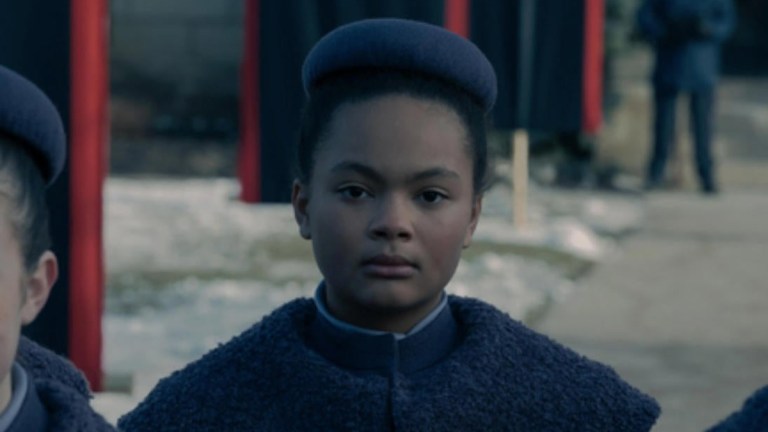The Handmaid’s Tale: Wife Schools Are No Gilead Invention
Everything in The Handmaid’s Tale has a real-life precedent, and the “Plums” are just the latest Gilead development inspired by true events.

Warning: contains spoilers for The Handmaid’s Tale Season 5 episode 5.
With its backdrop moved from the oppressive Gilead to the comparatively liberal borders of Canada, The Handmaid’s Tale’s fifth season has used these broader horizons to depict a world that, paradoxically, feels more claustrophobic than ever. Though ostensibly free as of Season 4, June’s world seems to be getting smaller and smaller. Her enemy Serena Waterford has set up shop nearby, new followers of Gilead’s regime have made themselves known, and anti-refugee protests are happening on the streets of Toronto.
Nowhere is the system that now traps June more evident than with her estranged daughter Hannah. Quite literally wrenched from June’s arms in the first season, Hannah is now apparently brainwashed and a pupil at one of Gilead’s “Wife schools” at only twelve years of age. In episode 5 ‘Fairytale’, June and Luke’s horror at what has befallen their daughter led to them making a dangerous mission into enemy territory that ended in their capture. They now possess a memory stick containing information on Hannah and “the Plums” (as Gilead’s young Wives-in-training are nicknamed on account of their dress color), but will it be of any use to them in Gilead custody?
Viewers will share June and Luke’s horror at the idea of their child being prepared for Wifely “duty” at such a young age. They may also feel a shiver that – as with so many things in the world of The Handmaid’s Tale – “wife schools” are not as fictional as we might wish them to be.
Real-World Wife Schools
Much dystopian fiction relies on real-world precedent. The Handmaid’s Tale novelist Margaret Atwood regularly explains that none of the brutal rites enacted in her 1985 book are pure invention. Everything she described had really happened somewhere in the world, at some time. Similarly, much that happens in the TV adaptation echoes or outright parallels real-world events. Forced separation between parents and children is a heartbreakingly commonplace event for people of many different cultural identities at many points in history up to the present day. Themes of exile, rape as a war crime, segregation, forced birth, and more are pervasive in the novel and series alike, and sadly, none of these things are limited to the imaginary.
Likewise, “wife schools” have many real-world counterparts, ranging from the seemingly benign to the openly oppressive. For instance, Julie N. Gordon’s book, quite literally titled Wife School, details a 22-week course highlighting ways to utilize the Bible in the quest to become the best wife possible, affirming that to be a “good wife” is to be in service to one’s husband.
Meanwhile, Russia’s “seduction schools” were the subject of the 2019 documentary School of Seduction, detailing a society in which women are meant to prioritize being a prize for a husband above all other ambitions in life. Further reflecting the gender essentialism of Putin’s regime, Russian Womanhood Schools enforce antiquated ideals that many would hope long since put to rest. In these systems, being an ideal housewife is the ultimate goal, which often entails muting one’s interests and desires in service to patriarchal structures.
More to the extreme, many religious cults are known for training women explicitly for the role of wife from very early on, with girls given no choice in the matter and likewise expected to act as oppressors to other girls. One of the unfortunately many examples is the surprisingly still operational Fundamentalist Church of Jesus Christ of Latter-Day Saints (FLDS), which, under the control of Warren Jeffs, created an environment in which strict gender roles were demanded of all, and young girls were expected to act as dutiful servants in ways not dissimilar to Gilead’s Wives.
Fans of Gilead
Though The Handmaid’s Tale is best known for its shocking moments, one of the key points where it so often succeeds is by showing not only the brutality of fascism but also its subtlety as it creeps in through the cracks in society. Season 5 has achieved this better than most by showing a society of women that, despite being free in Canada, support Gilead’s oppressive tactics and yearn for its authoritative control without fully understanding the reality of what that might mean.
This has been expertly reflected in Serena, who is a devout follower of Gilead and is now seeing some of the more negative side effects as she is limited in her political career and prevented even from communicating with the outside world. Showing us the negative effects of wifehood even on those it supposedly benefits is one of the most effective tools the show has for telling its audience how pervasive the human rights violations of Gilead are.
For June, there’s no selling short the gut-punch of discovering that her own child is being transformed into one of the oppressors that saw her and her friends abused or even killed. Still, one thing we have yet to learn is how Hannah feels. June has met Hannah only a few times since being forced apart, and she has always exhibited the level of apprehension toward her mother that one would expect of a child purposefully conditioned to fear her.
How “Wife school” will change Hannah is anyone’s guess, but as real-world precedent would indicate, she may have little choice in the outcome. Still, as real-life history and current affairs – including the present anti-government protests in Iran – no regime is wholly inescapable, no matter how tight its hold on its populace. Hannah may very well yet find a way to free herself regardless of the system that seeks to hold her in place, as so many fleeing similarly tyrannical environments have done throughout time.
The Handmaid’s Tale Season 5 streams on Wednesdays on Hulu in the US. It’s expected to air on Channel 4 at a later date in the UK.
